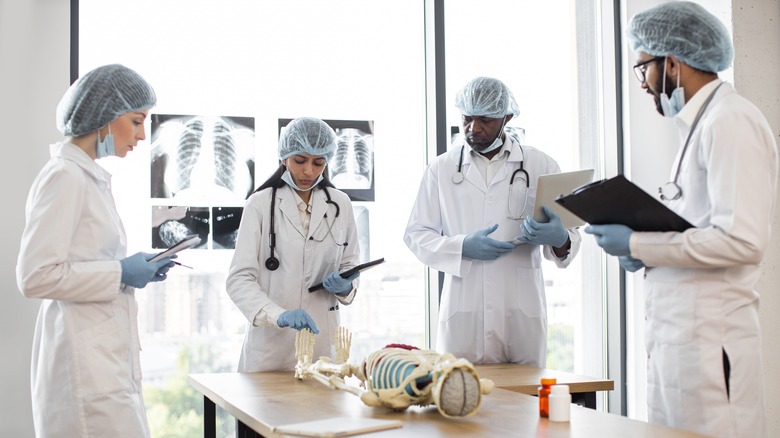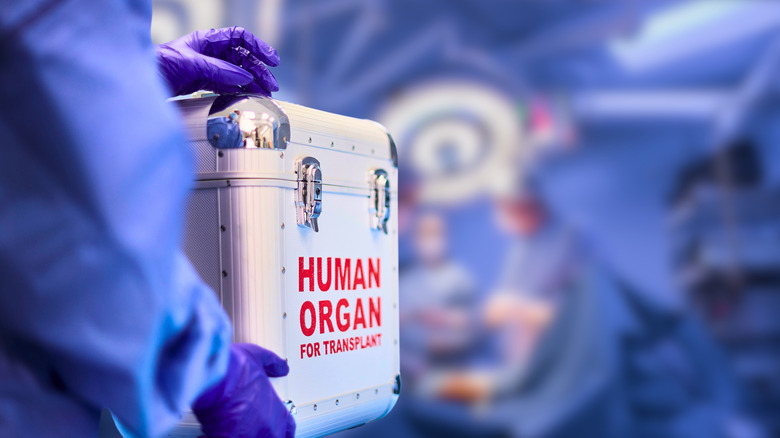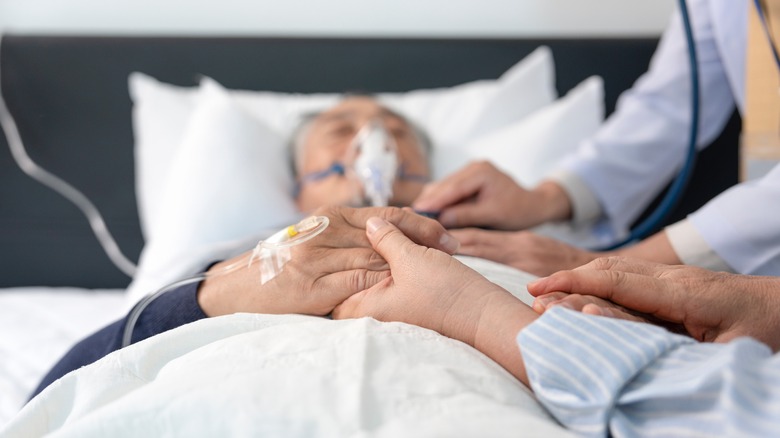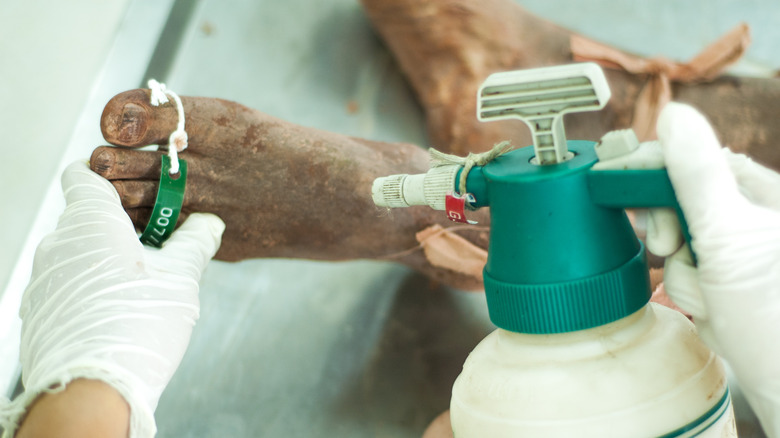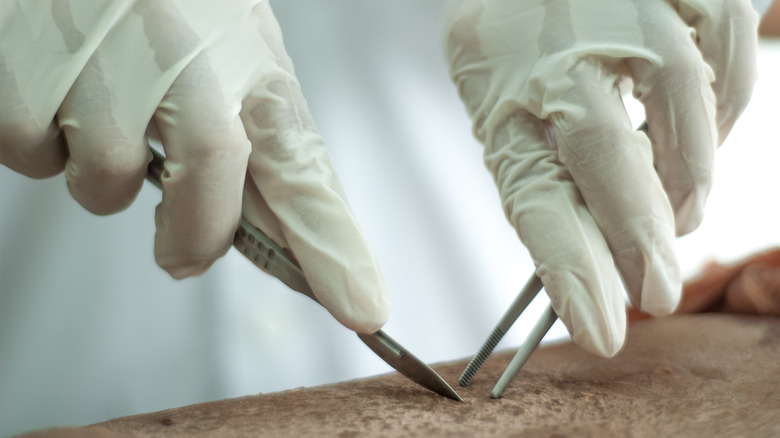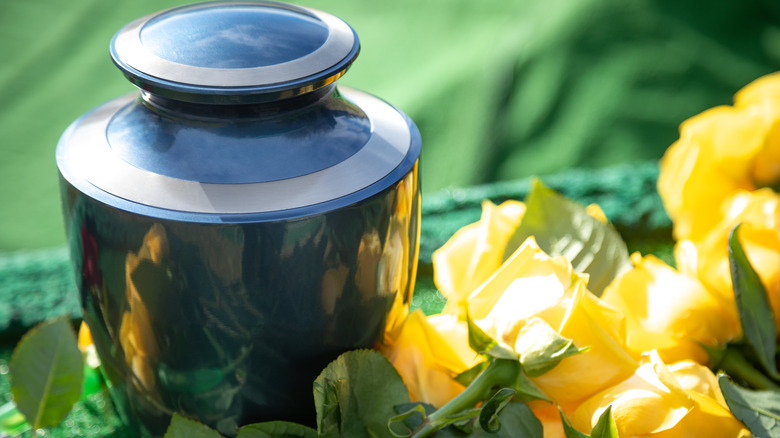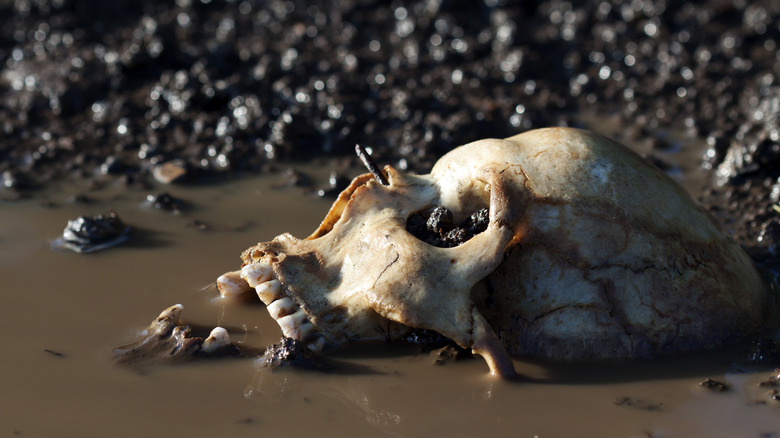What Actually Happens To Your Body When You Donate It To Science
Many people speak of wanting to leave a legacy after they die, whether through what they pass on in the form of their children or donating to a charity that they feel can do some good in the world. But what if instead of donating money, your legacy could be that you donate yourself? Donating your body to science so that people can learn from it once you no longer need it is a thoughtful and selfless act that can help to shape the future of science and medicine.
If you've never considered it before, it may seem a bit strange to think about, but if the next generation of medical professionals are to be properly trained, they need human bodies to practice on. The generous act of donating your body can help advance medical research and train doctors in new procedures, meaning your contribution to society will continue long after you have taken your last breath.
There are implications of this decision, however, mostly for those you leave behind. For this reason, thoroughly researching the process is crucial, and you should start looking into it sooner rather than later, to make sure you have plenty of time to explain things in depth with your family. From how to register as a donor, to the factors that may see your donation refused, let's take a look at what actually happens to your body when you donate it to science.
Registering to donate
If you think that donating your body to science is something you would like to seriously consider, you need to start by finding out how to register. Unlike registering to donate organs, there is a bit of paperwork to fill in. The registration process will be different depending on where you live in the world, so it is important to carefully research the options near you. As well as contacting local medical schools, you can get in touch with a body donation company such as Science Care that can talk you through the process and help you to register.
A crucial part of this stage is discussing your wishes with your family and loved ones. Though this can be a difficult topic to bring up, they will be the ones that need to set everything in motion once you have passed away, starting with notifying the institution of your death. If your family had no idea of your wishes previously, be prepared for them to be a little shocked or even upset, and to have lots of questions. For this reason, it is best to discuss your wishes with your loved ones as soon in the process as you can, and they can then support you throughout the registration process. It is important to understand that in most cases, your family cannot make the decision to donate your body to science after you are dead, even if you have told them you wish to do so. So if you are certain this is the path for you, make sure you register as soon as possible.
Can you donate your body and be an organ donor?
Once you have decided that you want some good to come from your body after your death, there is a good chance you have considered organ donation as well as donating your body to science. But can you do both? Well, you can definitely register for both options, but it is unlikely that, after your death, your body will be used in both situations.
Donating your organs means that soon after your death, your organs will be transplanted into someone else's body to allow them to continue living a full life. With 170 million people registered as organ donors in the U.S. as of 2022, you may assume that organs for transplant are readily available, but this is not the case. To donate an organ, you need to die in a very specific way — usually in intensive care — and the organs need to be transplanted within a few hours of death. This happens in less than 1% of deaths in the U.K., meaning that even if you register as an organ donor, there is not a high chance of your organs being used.
If you register as both an organ donor and a body donor and your organs are not used, your body will be donated to science in the way that you have registered for, meaning there is no reason not to register for both. In most cases, if organs are used, your body will not be donated for medical science, as the whole body is usually required intact.
What happens immediately after you die?
Though it seems like a strange and morbid thing to think about, it's important to understand and discuss with loved ones what will happen to your body from the moment you die. Firstly, your family will have to contact the company that you have chosen to donate your body to, so that they can set the process in motion. The establishment will want to take possession of your body as quickly as possible, so that they can go about preserving it before it begins to decay. If you don't die in a hospital, your family may need to arrange for a funeral home to store your body for a few days, if the center is unable to collect it straight away.
This is why the conversation with your family is so crucial. If your loved ones delay in informing the institution of your death, your body may not be suitable for donation by the time it is collected. To ensure a speedy transfer after your death, be sure to have an in-depth conversation while you are still fit and well.
Reasons your body may not be accepted
In spite of your altruistic wishes, wanting to donate your body to science may not be enough — there are certain criteria that need to be satisfied. The good news is, there are fewer restrictions compared to being an organ donor, so there is a good chance you will be accepted.
The biggest issue is infectious disease — since medical students will be handling your body, it is important that they aren't being put at risk. If a person has an infectious disease such as HIV, MRSA, or hepatitis at the time of death, their donation will be denied. Advanced cancer can also be a reason for denial, especially if it has spread throughout the body. Another issue can be if an autopsy was required to ascertain the cause of death — the damage to the body as a result would likely make it unusable. Extremes of weight can also pose an issue, either extremely underweight or overweight bodies may not be accepted.
Since many of these factors may not become apparent until close to, or after the time of death, it is important as part of your discussion with your next of kin that you put in place alternative arrangements, should your kind offer of body donation be denied. In that case, funeral arrangements will need to be organized and paid for by your loved ones.
How will your body be preserved?
Once your body has arrived at the medical facility, the priority will be to preserve it as fully as possible to make it usable in the coming months, or even years. While the embalming process that happens in a funeral home is designed to make a body look presentable for a few days or at most weeks, bodies donated to medical science need a much more thorough process. At Cambridge University, the process can take many months, meaning that bodies received after the academic term begins will not be ready for use until the following year.
At Ohio State University, they have developed a new method of preserving donor bodies that has been in use since 2019. Instead of the usual formaldehyde, they use glycerol, phenol, and alcohol. This provides a more life-like representation than a body embalmed in the usual way, and it allows the body to be used for a longer period of time.
While the exact methods and chemicals used to preserve the donated bodies will vary between each establishment, the purpose remains the same. Showing the maximum respect to each person who has given their body to science means embalming it in a way that allows it to be used as extensively as possible.
Ways in which your body will be used
As you are considering donating your body to science, you likely want to know what it will actually be used for. This can vary widely, but in most cases there are three main categories — teaching the full diagram of the human body, research into disease, and training doctors to conduct clinical procedures. When it comes to medical students learning anatomy, modern technology means there are various hi-tech ways they can learn (like doctors and surgeons making use of virtual reality) — but nothing can beat the real life example of a human body. Real flesh gives the students a perspective that a digital version simply cannot compare with, and allows them to have hands-on experience before they progress to live patients.
The second main use for your body is to progress understanding of disease and how it affects body tissues. While research can be performed in some cases on tissue removed from live patients, much more effective studies can be done when you don't need to worry about harming the patient in the process. In addition, brain studies are very difficult to do with live patients, so a donated body can prove crucial in the fight against neurological conditions such as Alzheimer's and brain tumors.
The final main use of your body will be for clinical training. As a patient, it is not ideal if the first time a doctor or nurse has performed a particular procedure is on you, so having access to cadavers to practice on can benefit everyone. As well as medical students learning new skills, donated bodies can also be used for experienced doctors to try out new surgical techniques. (After all, medical science can't rely on crazy techniques from the past.)
What happens after your body has been used?
So your after-death altruistic wish has been fulfilled, and your body has been used to move science forward and train the next generation of medical professionals on how to navigate the major organ systems of the body — now what? It is important for you to consider — and discuss with your family, of course — what will happen after the medical institution can no longer use your body. Bear in mind that this could be years after your death, depending on how the body is preserved and used.
Standard procedure is for a cremation to take place, with the medical center covering the cost. Loved ones will be invited to the ceremony, and students who have benefitted from the donor often attend, too, as a respectful thank you. In some establishments, all the donated bodies are cremated at the end of the term, to bring closure to the academic year that has passed. Ashes will be returned to your family afterwards.
If your loved ones would prefer a private cremation or burial, this will need to be discussed in advance, so make sure to bring it up before you register. Since your family won't have your body returned to them for a long time after your passing, they may feel they will miss out on the closure that a funeral brings. They can have an end-of-life ceremony without your body being present, which, for many, will bring the same sense of peace that a cremation or burial would. However, if your family feels strongly that the lack of your body will prevent them from grieving your death, you may need to consider this when making your decision.
Alternatives to donating to medical science
If you're certain that you want to do something productive with your body after death, but are not totally set on donating to a medical establishment, there is another, less well-known option to consider. Body farms may sound like some grotesque concept from a horror film, but they do exist, and there is a lot of science involved.
The main purpose of a body farm is to allow corpses to go through the stages of decomposition naturally under a variety of conditions, and monitor exactly what happens. This can be incredibly useful in the field of criminology and forensic science, giving insight into how environment affects a dead body, and allowing them to compare real-life cases with the samples on the farm.
In contrast to the procedure involved for donating to medical science, if you leave your corpse to a body farm, it will not be embalmed, as this would affect the human decomposition process. It is crucial to understand that in the case of a body farm, your remains will not be returned to your loved ones, which is something that could be a big issue for them. You should make sure to consider all the implications of donation and discuss them thoroughly, to prevent unnecessary additional grief after your passing.
